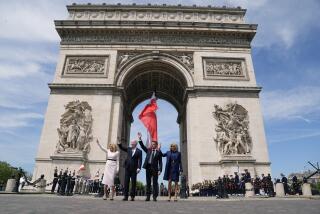The French Definition of ‘Help’
- Share via
It’s official: France is suddenly trying to help the United States in Iraq.
President Jacques Chirac said to NATO leaders in late February that “France wants to contribute to stability” in Iraq. The contribution? Some $660,000 to a NATO fund for military and police training in Iraq and one French mid-level officer who’s being assigned to the training mission at NATO headquarters in Brussels. Not 1,000 officers. Not 100. Just one.
It was perfectly legitimate for France to oppose the war (which this editorial page did as well). But it is now time for both sides of this debate to recommit to the transatlantic alliance. Moreover, though European nations disagreed among themselves about the wisdom of the U.S. invasion of Iraq, they all share an interest -- arguably a greater interest than even the United States -- in promoting peace and stability across the Middle East. It’s churlish Gallic pique to begrudge the U.S. anything more than symbolic assistance in rebuilding Iraq into something more than a battleground for terrorists.
Then again, maybe it shouldn’t be that surprising that France is sulking. Paris has never been that enthusiastic about the transatlantic alliance, and it has long been an axiom of French policy to undermine NATO at every turn.
Ever since Charles de Gaulle pulled France’s military out of NATO in 1966, Paris has cherished the illusion that it is something more than a minor power. But the only thing that De Gaulle accomplished by bolting from NATO was having the alliance’s headquarters moved from Paris to Brussels. France’s attempt to carve out a distinct foreign policy has been distinguished by little more than rank opportunism. During the Cold War it tried to play the U.S. off against the Soviet Union, and in 1989, French President Francois Mitterrand even thought he could stop the steamroller of German reunification by traveling to East Germany and exhorting it to remain an independent state. By 1993, France had bowed to the inevitable and returned to NATO’s military command.
France, because of its rich culture and storied history, still likes to see itself as the driver of the European Union, alongside a Germany that is still too ashamed (the French keep hoping) to throw its weight around. It aggravates France to see nations like the Netherlands and Poland placing their allegiance with the Americans above any French-defined European solidarity. Who can forget Chirac’s haughty outburst in early 2003 when he said pro-American leaders of Eastern Europe had “missed an opportunity to keep quiet.”
The Iraqi debate was a gift to Chirac, an opportunity to drive a wedge between Germany and Britain and between Europe and the United States. So it’s easy to understand why he and the rest of French officialdom is finding it so hard to move on.
More to Read
Sign up for Essential California
The most important California stories and recommendations in your inbox every morning.
You may occasionally receive promotional content from the Los Angeles Times.









